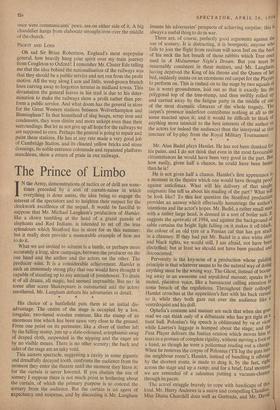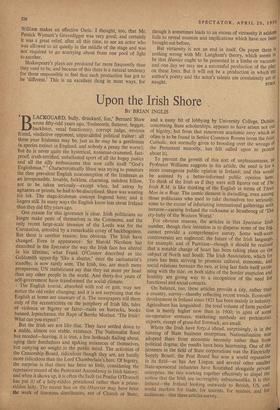The Prince of Limbo
IN the Army, demonstrations of tactics or of drill are some- times preceded by a sort of curtain-raiser in which everything is ,done amiss, the idea being to engage' the interest of the spectators and to heighten their respect for the clockwork excellence of the sequel. It would be fanciful to suppose that Mr. Michael Langham's production of Hamlet, like a clown tumbling at the head of a grand parade of elephants and Red Indians, is intended to set off the 'true splendours which Stratford has in store for us this summer; but it really does provide a memorable example of how not to do it.
What we are invited to witness is a battle, or perhaps more accurately a long, slow campaign, between the producer on the one hand and the author and the actors on the other. The producer wins. It is a considerable achievement. Hamlet is such an immensely strong play that one would have thought it capable of standing up to any amount of punishment. To drain it of all drama, all magic, had seemed impossible. But no : in scene after scene Shakespeare is outsmarted and the actors smothered. Mr. Langham defeats his adversaries in detail.
His choice of a battlefield puts them at an initial dis- advantage. The centre of the stage is occupied by a low, irregular, two-tiered wooden rostrum, like the stump of an enormous tree which has been sawn very close to the ground. From one point on its peiimeter, like a sliver of timber left by the falling stump, juts up a slate-coloured, ectoplasmic swag of draped cloth, suspended in the nipping and the eager air by no visible means. There is no other scenery; the back and sides of the stage are an inky void.
This austere spectacle, suggesting a cavity in some gigantic and dreadfully decayed tooth, confronts the audience from the moment they enter the theatre until the moment they leave it; for the curtain is never lowered. If you disdain the use of scenery 1 suppose there is not much point in bothering about the curtain, of which the primary purpose is to conceal the scenery from the audience. But the curtain is an agent of expectancy and suspense, and by discarding it Mr. Langham lessens his adversaries' prospects of achieving surprise; this is always a useful thing to do in war.
There are, of course, perfectly good arguments against the use of scenery. It is distracting, it is bourgeois; anyone who fails to join the flight from realism will soon feel on the back of his neck the hot breath of those rabbits which Tree once used in A Midsummer Night's Dream. But you must be reasonably consistent in these matters, and Mr. Langham, having deprived the King of his throne and the Queen of her bed, suddenly insists on an enormous red carpet for the Players to perform on. This is rushed on to the stage by two squads of (as it were) groundsmen, laid out so that it exactly fits the polygonal top of the tree-stump, and then swiftly rolled UP and carried away by the fatigue party in the middle of one of the most dramatic climaxes of the Whole tragedy. The carpet's presence underfoot contributes nothing at all to the scene enacted upon it; and it would be difficult to think of anything more inimical to the best interests of the author or the actors (or indeed the audience) than the interposal at this juncture of by-play from the Royal Military Tournament.
Mr. Alan Badel plays Hamlet. He has not been thanked for his pains, and I do not think that even in the most favourable circumstances he would have been very good in the part. But how easily, given half a chance, he could have been better than he is !
He is not given half a chance. Hamlet's first appearance is a moment in the theatre which one would have thought proof against anticlimax. What will his delivery of that single: enigmatic line tell us about his reading of the part? What will he look like? To this last question the Stratford production provides an answer which effectually hamstrings the authors intentions and the actor's hopes. Mr. Badel, a rather small mall with a rather large head, is dressed in a sort of boiler suit. It suggests the apres-ski of 1984, and against the background of sable curtains the bright light falling on it makes it off-black, the colour of an old tyre or a Persian cat that has got stall in a chimney. If they had put Mr. Badel in a nice white shirt and black tights, we would still, I am afraid, not have been electrified; but at least we should not have been puzzled and disconcerted.
Perversity is the key-note of a production whose guiding principle is that whatever seems to be the natural way of doing anything must be the wrong way. The Ghost, instead of boom• ing away in an awesome and sepulchral manner, speaks in a muted, plaintive voice, like a bureaucrat calling attention t° some breach of the regulations. Throughout their collogllY Hamlet crouches at the apparition's feet with his back turned to it, while they both gaze out over the audience like 0 ventriloquist and his doll. Ophelia's costume and manner are such that when she goes mad we can think only of a debutante who has got tight at a hunt ball. Polonius's big speech is obliterated by va et vie° while Laertes's luggage is humped about the stage; and the First Player delivers the fustian oration which moves him t° tears in a posture of complete rigidity, without moving a foot or a hand, as though he were a policeman reading out a charge. When he removes the corpse of Polonius (I'll lug the guts into the neighbour room'), Hamlet, instead of bundling it offstage by the shortest route, is made to drag it, by the feet, right across the stage and up a ramp; and for a brief, fatal moment we are reminded of a salesman putting a vacuum-cleaner through its paces. The actor struggle bravely to cope with handicaps of this kind. Mr. Harry Andrews is a suave and compelling Claudius' Miss Diana Churchill does well as Gertrude, and Mr. David William makes an effective Osric. I thought, too, that Mr. Patrick Wymark's Gravedigger was very good; and certainly it was a great relief, after all this time, to see an actor who was allowed to sit quietly in the middle of the stage and was not required to go scurrying about from one pool of light to another.
Shakespeare's plays are produced far more frequently than they used to be, and because of this there is a natural tendency for those responsible to feel that each production has got to be 'different.' This is an excellent thing in most ways, for though it sometimes leads to an excess of virtuosity it seldom fails to reveal nuances and implications which have not been brought out before. But virtuosity is not an end in itself. On paper there is nothing wrong with Mr. Longhorn's theory, which seems to be that Hamlet ought to be presented in a limbo or vacuum; and one day we may see a successful production of the play on these lines. But it will not be a production in which the author's poetry and tha actor's talents are consistently set at naught. MIX



















































 Previous page
Previous page